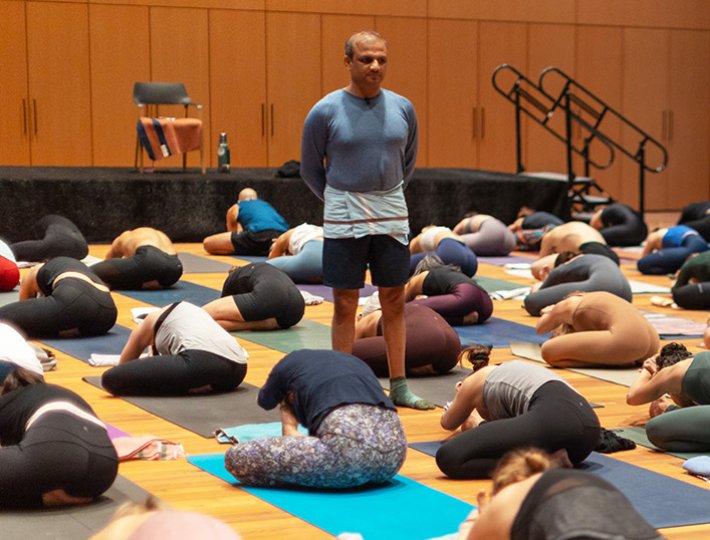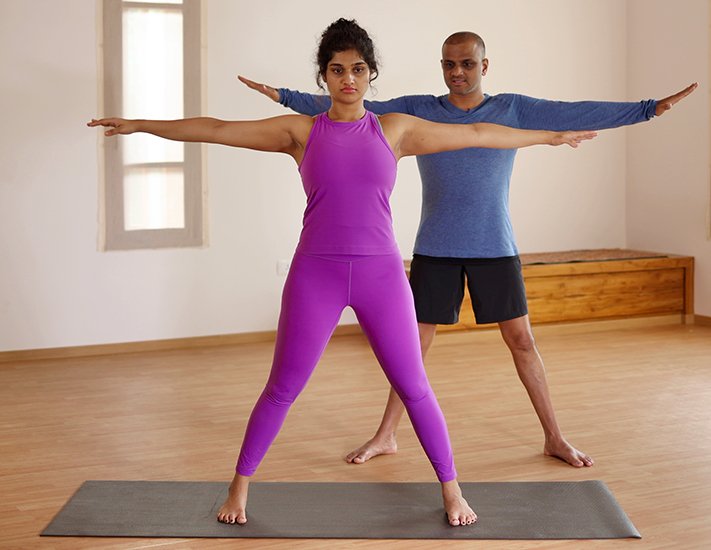As feasts full of savory and sweet creations find their way to your face this holiday season, let go of guilt and be gracious for the gifts of nourishment and togetherness. Buddha’s full belly represents contentment and plentitude, after all. After the feast, give yourself some time to rub your stomach, then, take a deep breath and turn to your yoga practice to care for your digestive health, a key part of overall well-being and happiness.
These five yoga poses for digestion will help you feel relief after the feast.
Seated Cat-Cow
Great for spine care, this two-pose sequence is a favorite, but it’s also an internal massage that stretches and contracts your abdominals. If those mashed potatoes are sitting in your belly like a lump, be grateful that this two-pose combo will help loosen things up and get them going to their “final destination.”
Prop yourself up on a blanket to position your spine well; ideally, your hips should be above your knees. Match your Cow Pose (belly moving forward, shoulders back) with the inhale.
Transition into the exhale and Cat Pose (belly moving backward, shoulders forward), and repeat several times.
Garland Pose
Feeling bloated and gassy is no fun for you, or anyone around you, for that matter. This pose assists you in releasing what needs to come out. (In some cultures this is how women give birth, using gravity to assist the release.) Be grateful your body can help itself to let go, naturally.
 Squat with your feet about as wide as your shoulders; if your heels don’t touch the floor, slide a blanket under your heels to support your feet and foundation. Try to lengthen your spine and widen the space across the front of your chest and breathe deeply.
Squat with your feet about as wide as your shoulders; if your heels don’t touch the floor, slide a blanket under your heels to support your feet and foundation. Try to lengthen your spine and widen the space across the front of your chest and breathe deeply.
Leg-Binding Pose (Pre-Natal Variation)
In yoga, twists are known to squeeze away toxins and allow digestive organs to soak in fresh blood flow, which helps your digestive functions do their job well. This sage pose version, turning away from the upright bent leg, leaves healthy room for the baby in a pre-natal practice. It could be nice for a temporary “food baby” too. Aren’t we grateful for it all?
Prop yourself up on blankets to lengthen out of your lower back, especially if your back and hamstrings are tight. It’s best if the foot of the bent knee is fully grounded; the foot of the extended leg can be flexed to support the knee joint.
Wind Relieving Pose
This pose is called “wind relieving” pose and contains the name of a yogic energy, apana, which rules both grounding and downward release. When your right knee presses into your right side body, it massages your ascending colon; the left side takes care of your descending colon. Sometimes we can be really grateful certain ups and downs benefit us completely.
 Make sure your floor surface is flat; you can have padding, such as a smooth blanket or mat. Bring your knees in, slightly to the sides of your torso, keeping as much of your spine on the floor as possible.
Make sure your floor surface is flat; you can have padding, such as a smooth blanket or mat. Bring your knees in, slightly to the sides of your torso, keeping as much of your spine on the floor as possible.
Related: Digestion Trouble? The Surprising Posture Tip You Need to Know
Reclined Cobbler’s Pose
Laying on your back and opening up the pelvic and abdominal area, you encourage freedom in your digestive and elimination systems. This pose can also relax your mind, which can help your body do its job calmly during a “food coma.” Be grateful we can always give ourselves the support and space we need. 
On your back, you can have padding, such as a blanket or mat; make sure your neck is elongated, not bent backward or forward. With the soles of your feet together, let your knees fall away from each other; place rolled up blankets or pillows evenly under each thigh/knee to let your hips release without strain.
Enjoy the bounty of the season, and take good care to practice self-care!
Photos by Hailey Wist; Outfitted by Athleta














Comments (1)